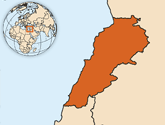
17 February 2020 – The Ministry of Public Health, along with the Lebanese Pediatric Society, WHO and UNICEF, is very concerned about certain misconceptions expressed by parents on social media platforms following December's measles vaccination campaign.The only way to protect a child against measles is vaccination.
Since it began in early 2018, the measles outbreak has spread to all 8 Lebanese governorates, accounting for more than 2000 reported cases, most among children under 10 years of age.
“Choosing to not vaccinate your children during the campaign not only leaves them susceptible to measles, but also exposes other children to measles,” said Dr Walid Amar, Director General of the Ministry of Public Health. “The Ministry of Public Health, with the support of WHO and UNICEF, provides safe and effective vaccines free of charge to children through trained teams of health workers in all institutions. We urge all parents to take advice from health professionals on health issues because health policies and practices are evidenced-based and not based on rumours”.
Measles is a serious and highly contagious disease. If not prevented, measles can cause serious complications including meningitis, severe diarrhoea and dehydration, pneumonia and ear infections and even death. Measles survivors are often left with lifelong disabilities, such as blindness, deafness and brain damage.
“It is important to vaccinate your children during the campaign. The third additional dose of the measles containing vaccine is crucial for optimal immunity and it is safe,” explained Dr Bizri, Head of National Certification Committee. “The cold chain at the Ministry Central Drugs Warehouse and the primary health care facilities are of optimal quality and ensure safe storage of vaccines. Finally, it is important to note that the Ministry provides free vaccines to some major private sector health facilities”.
“The measles vaccine is safe and effective. To be better protected a child needs to receive at least 2 doses of measles, and there is no harm in receiving an additional dose. There are no reasons children should still be dying of this disease,” added Dr Majdalani, Head of the Lebanese Pediatric Society.
“Immunizatios can save a child’s life and vaccines are only given to children after a long and careful review by scientists, doctors, and health-care professionals. The only way to halt the epidemic currently is to vaccinate all children, between the ages of 6 months and 10 years. The measles vaccine protects children against avoidable lifelong complications and potentially death. No child should be left behind” said Dr Shankiti, WHO Representative in Lebanon.
The measles vaccine is procured by UNICEF through its Global Supply Division which is responsible for buying all vaccines and related items for global campaigns to eradicate polio, eliminate neonatal and maternal tetanus, and control measles. All vaccines procured through UNICEF are WHO pre-qualified and follow strict safety standards and quality control. WHO and UNICEF promote vaccine security by working with manufacturers to ensure there is a reliable supply of quality, affordable vaccines, and with governments to assess their vaccine requirements.
“UNICEF has a key role in vaccine procurement and procuring immunization supplies on behalf of around 100 countries annually,” said Yukie Mokuo, UNICEF representative in Lebanon. “For the past 25 years UNICEF has brought quality vaccine to the Ministry of Public health to vaccinate all children in Lebanon. Parents and communities are urged to take part in the upcoming measles vaccination campaign to reach every child.”
WHO and UNICEF are working with the ministry of Public Health to support vaccine supply and cold chain management, on-the-ground coordination, operations support and monitoring. WHO and UNICEF are also working with the Ministry to ensure clear communication to mobilize the general public aiming to achieve high turnout of all children under 10 years of age for vaccination.
Representatives from the Ministry of Public Health, WHO, UNICEF, the Lebanese Pediatric Society, regional delegates and the heads of other medical societies, stressed during the meeting the need for commitment and active participation in the campaign, and the need to urge parents and advise them to give their children the extra dose during the campaign regardless of previous doses and that the vaccines provided by the Ministry of Public Health are safe and effective and that the cold chain in its central warehouse and in primary health care centers are of ideal quality and are subject to safe storage conditions.
The second phase of the national immunization campaign will be launched in April 2020 targeting children aged between 6 months to 10 years. All children will also receive vaccination with bivalent oral polio vaccine. Children will be reached in primary health-care centres/dispensaries, schools, nurseries and private clinics, as well as in informal settlements.








